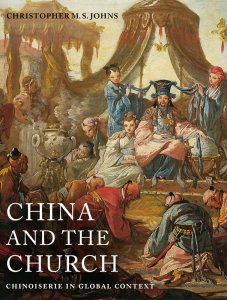Home » HART » Christopher Johns Receives Chancellor’s Award for Research at Fall Faculty Assembly
Christopher Johns Receives Chancellor’s Award for Research at Fall Faculty Assembly
Posted by vrcvanderbilt on Monday, August 29, 2016 in HART, VRC.
 Christopher Johns, Norman L. and Roselea J. Goldberg Professor of History of Art, received the Chancellor’s Award for Research at the Fall Faculty Assembly on August 25. Johns was recognized for his book The Visual Culture of the Catholic Enlightenment (Penn State University Press, 2014), a culmination of many years of painstaking archival research. The book reflects a keen sense of mature interpretive conceptualization. It embodies his field-defining contribution to eighteenth-century European cultural history.
Christopher Johns, Norman L. and Roselea J. Goldberg Professor of History of Art, received the Chancellor’s Award for Research at the Fall Faculty Assembly on August 25. Johns was recognized for his book The Visual Culture of the Catholic Enlightenment (Penn State University Press, 2014), a culmination of many years of painstaking archival research. The book reflects a keen sense of mature interpretive conceptualization. It embodies his field-defining contribution to eighteenth-century European cultural history.
“Christopher’s writing has been described as a ‘magisterial and ground-breaking work,’” Zeppos said. “It is a landmark for his discipline that will influence generations of scholars to come.”
Until relatively recently, most scholars considered the notion of a Catholic enlightenment either oxymoronic or even illusory, since the received wisdom was that the Catholic Church was a tireless and indefatigable enemy of modernist progress. According to Johns, however, the eighteenth-century papacy recognized the advantages of engaging with certain aspects of enlightenment thinking, and many in the ecclesiastical hierarchy, both in Italy and abroad, were sincerely interested in making the Church more relevant in the modern world and, above all, in reforming the various institutions that governed society.
Johns has written another  groundbreaking study that examines chinoiserie—European works of art and visual culture that were influenced by Chinese art—in the context of church and state politics, with particular focus on the Catholic missions’ impact on Western attitudes toward China and the Chinese. In his book, China and the Church: Chinoiserie in Global Context (University of California Press, 2016), Johns demonstrates that the emperor’s 1722 prohibition against Catholic evangelization, which occurred after almost 150 years of tolerance, prompted a remarkable change in European visualizations of China in Roman Catholic countries.
groundbreaking study that examines chinoiserie—European works of art and visual culture that were influenced by Chinese art—in the context of church and state politics, with particular focus on the Catholic missions’ impact on Western attitudes toward China and the Chinese. In his book, China and the Church: Chinoiserie in Global Context (University of California Press, 2016), Johns demonstrates that the emperor’s 1722 prohibition against Catholic evangelization, which occurred after almost 150 years of tolerance, prompted a remarkable change in European visualizations of China in Roman Catholic countries.
 Emerging from an international conference on the papacy of Pope Benedict XIV Lambertini (reigned 1740-1758) and its legacy, the anthology Benedict XIV and the Enlightenment: Art, Science, and Spirituality (University of Toronto Press, 2016) offers a broad and nuanced assessment of Benedict’s engagement with Enlightenment art, science, spirituality, and culture. Johns, co-editor of the volume, contributed two essays: “Introduction: Benedict XIV and Catholic Enlightenment” and “The Papacy and Coffee Culture: Benedict XIV’s Coffee House in the Quirinal Gardens.”
Emerging from an international conference on the papacy of Pope Benedict XIV Lambertini (reigned 1740-1758) and its legacy, the anthology Benedict XIV and the Enlightenment: Art, Science, and Spirituality (University of Toronto Press, 2016) offers a broad and nuanced assessment of Benedict’s engagement with Enlightenment art, science, spirituality, and culture. Johns, co-editor of the volume, contributed two essays: “Introduction: Benedict XIV and Catholic Enlightenment” and “The Papacy and Coffee Culture: Benedict XIV’s Coffee House in the Quirinal Gardens.”

©2026 Vanderbilt University ·
Site Development: University Web Communications